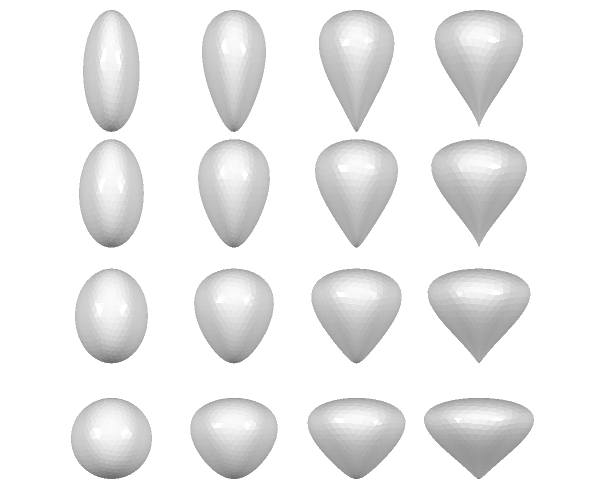shape_morph
Creates a vertex interpolation between isomorphic solids.
Signatures
- shape_morph( solid base, solid variant1, float fraction1, ... )
Details
The shape_morph function creates a geometric interpolation between each vertex of the base mesh base and the counterparts vertices in the variant meshes. The technique is also known as morph target animation. The base solid and all its variants need to be isomorphic meshes. The fraction specifiers must be in the range [0,1] and defines the amount each variant is blended into the result. The base variant will be selected if all variants fractions are set to 0 and a pure variant is selected if it has a fractional value of 1 while all others of have a fraction 0.
Example
float d = 4.0
float e = 8
float f = 1
solid a = sphere( d )
solid b = boxwarp( <[-d, -d, -d]>, <[+d, -d, -d]>, <[-d, +d, -d]>, <[-d, -d, +d]>,
<[-f, -f, -d]>, <[+f, -f, -d]>, <[+f, +f, -d]>, <[-f, +f, -d]>,
<[-e, -e, +d]>, <[+e, -e, +d]>, <[+e, +e, +d]>, <[-e, +e, +d]> ) >> a
solid c = scaling( 0.7, 1.0, 1.5 ) >> a
for( int i = 0; i <= 3; ++i )
for( int j = 0; j <= 3; ++j )
make translation( <[i * 12.0, 0.0, j * 12.0]> ) >>
shape_morph( a, b, (float) i/3, c, (float) j/3 )

Result of the example application of shape_morph. On the lower left is the pure base shape a, on the lower right the result of only the boxwarp modifier and on the upper left the result of only the scaling. The upper right shows the shape_morph blending between both operations.
Return value
A solid that is the interpolation of the different input solids.
Parameters
- base
-
A solid that is the base shape of the shape morphing.
- variantX
-
A solid that is a geometric variation of the base shape. It needs to be isomorphic to the base shape.
- fractionX
-
A fractional value in the range [0,1] that determines the amount the particular variant is blended into the final result. A value of 0 means that the variant is not taken into account at all. A value 1 means that it is fully taken into account.
